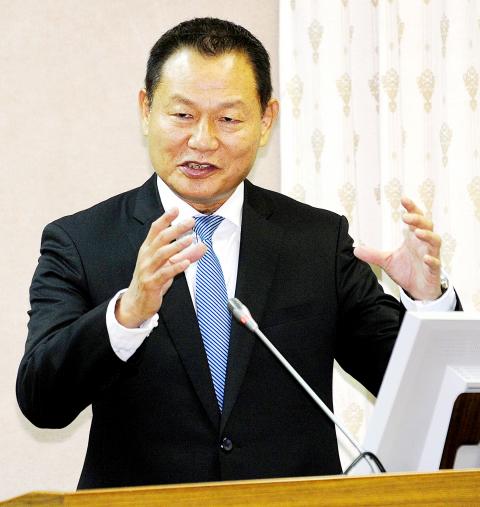China has been escalating its cyberwarfare against Taiwan, using an army of 180,000 cyberspies and more sophisticated methods to hack and steal information from government agencies and industries, the National Security Bureau (NSB) said in a report to the legislature yesterday.
The report said that this “cyberarmy” works at the Chinese People’s Liberation Army’s (PLA) General Staff Headquarters and its seven regional command centers, as well as national defense research and development agencies, state research centers and major universities.
“All our government and military agencies, industrial facilities, science and technology centers are vulnerable and under increasing attack by Chinese cyberwarfare,” NSB Director-General Lee Shying-jow (李翔宙) said.

Photo: Chen Chih-chu, Taipei Times
Taking his agency as an example, Lee said the bureau’s Web site detected 7.226 million hacking incidents last year, including 238,764 malicious attacks.
That is more than double the figure of 3.44 million hacking attempts (70,000 malicious attacks) found in 2012, bureau officials told lawmakers during a question-and-answer session in April last year.
Lee and bureau officials confirmed that the majority of these hacker intrusions and cyberattacks originated in China.
Lee said Taiwan faces an increasing Chinese cyberespionage threat on two fronts.
First, as the administration of government Web sites and network security management is increasingly contracted out to the private sector, China’s cyberarmy has targeted these Internet service providers and software developers, hacking into Web administrator accounts to plant malware or steal sensitive information from government sites.
Second is the upsurge in the use of smartphones, tablet computers and other personal mobile devices among the public and government employees, with the number estimated to have reached 10.53 million individuals last year, out of the nation’s total population of 23.37 million.
Lee said China’s cyberforce has developed various types of malicious apps and virus software that users unwittingly download to their telephones and other mobile devices.
“These malicious mobile apps hack into the user’s smartphone operating system, from where it gains access and hijacks personal data, including e-mail account passwords and contact lists, and can even monitor telephone conversations,” he added.
Taiwan’s national security and military agencies were alerted by a report by Canadian journal Kanwa Asian Defence Monthly this week, which said a PLA surveillance station on Hong Kong’s highest mountain, Tai Mo Shan, is equipped with the latest technology to intercept and record signals from cellphones, Wi-Fi networks and radio transmissions.
Kanwa said the station’s equipment includes an intelligence antenna typical of PLA Unit 61398 in Shanghai, which is said to be a main Chinese cyberwarfare and commercial espionage operations center against foreign countries.
Lee added that Chinese cyberspies had intensified their operations, targeting not only Taiwanese government agencies, but also political parties and their affiliated organizations, academics and research institutes, to collect personal information, such as job titles, e-mail addresses and telephone numbers.
These Chinese cyberunits then send out malware or viruses in the guise of e-mails announcing important official events to entice recipients to open them, allowing them to hack into these targeted groups, Lee said.

ACTION PLAN: Taiwan would expand procurement from the US and encourage more companies to invest in the US to deepen bilateral cooperation, Lai said The government would not impose reciprocal tariffs in retaliation against US levies, President William Lai (賴清德) said yesterday, as he announced five strategies to address the issue, including pledging to increase Taiwanese companies’ investments in the US. Lai has in the past few days met with administrative and national security officials, as well as representatives from various industries, to explore countermeasures after US President Donald Trump on Wednesday last week announced a 32 percent duty on Taiwanese imports. In a video released yesterday evening, Lai said that Taiwan would not retaliate against the US with higher tariffs and Taiwanese companies’ commitments to

Intelligence agents have recorded 510,000 instances of “controversial information” being spread online by the Chinese Communist Party (CCP) so far this year, the National Security Bureau (NSB) said in a report yesterday, as it warned of artificial intelligence (AI) being employed to generate destabilizing misinformation. The bureau submitted a written report to the Legislative Yuan in preparation for National Security Bureau Director-General Tsai Ming-yen’s (蔡明彥) appearance before the Foreign Affairs and National Defense Committee today. The CCP has been using cognitive warfare to divide Taiwanese society by commenting on controversial issues such as Taiwan Semiconductor Manufacturing Co’s (TSMC, 台積電) investments in the

‘SPECIAL CHANNEL’: Taipei’s most important tasks are to stabilize industries affected by Trump’s trade tariffs and keep negotiations with Washington open, a source said National Security Council Secretary-General Joseph Wu (吳釗燮) arrived in the US for talks with US President Donald Trump’s administration, a source familiar with the matter said on Friday. Wu was leading a delegation for a meeting known as the “special channel,” the Financial Times reported earlier. It marked Trump’s first use of the channel since returning to the White House on Jan. 20. Citing a source familiar with the matter, the Financial Times reported that Minister of Foreign Affairs Lin Chia-lung (林佳龍) was also a part of the delegation. The visit came days after China concluded war games around Taiwan and amid Trump’s

HELPING HAND: The steering committee of the National Stabilization Fund is expected to hold a meeting to discuss how and when to utilize the fund to help buffer the sell-off The TAIEX plunged 2,065.87 points, or 9.7 percent, to close at 19,232.35 yesterday, the highest single-day percentage loss on record, as investors braced for US President Donald Trump’s tariffs after an extended holiday weekend. Amid the pessimistic atmosphere, 945 listed companies led by large-cap stocks — including Taiwan Semiconductor Manufacturing Co (TSMC, 台積電), Hon Hai Precision Industry Co (鴻海精密) and Largan Precision Co (大立光) — fell by the daily maximum of 10 percent at the close, Taiwan Stock Exchange data showed. The number of listed companies ending limit-down set a new record, the exchange said. The TAIEX plunged by daily maxiumu in just